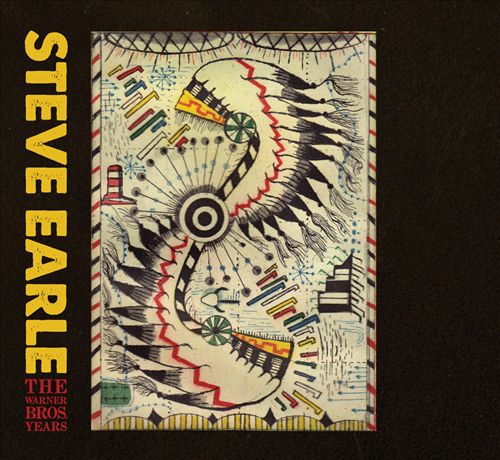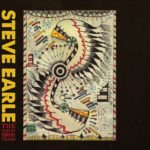
Shout! Factory
In December of 1994, the state of Tennessee proclaimed Steve Earle a free man: he’d done prison time for possession of cocaine and heroin and had cleaned up in a treatment center. But “free”? Not really – as any addict will tell you, the term is “recovering,” not “former.” All the demons that sideswiped Earle in the past, knocking him on his ass after he burst onto the scene with 1986’s Guitar Town, followed by Exit 0 (’87) and the classic Copperhead Road in 1988 were still out there. Earle’s character John Lee Pettimore in Copperhead Road’s darkly rocking title track was a piece of work, but at least Pettimore wrestled his demons out in the backwoods. Earle’s alcohol-and-dope-fueled nosedive was a public one, with 1990’s The Hard Way and the following year’s live Shut Up and Die Like An Aviator chronicling his downward spiral.
Getting busted and serving time no doubt saved Steve Earle’s life – the two big questions awaiting him on the outside were A.) could he stay clean and sober? and B.) would he/could he produce music once again?
Question B was answered pretty quickly with the string of albums found in this collection: 1995’s Train A Comin’, followed by I Feel Alright the following year and El Corazón in ’97 – each with its own sound; each a dose of pure Steve Earle; each a solid piece of work. One could say question A is still being answered 19 years later, but Earle’s talents have only increased with age and he knows what he’s talking about when he writes in the liner notes to The Warner Bros. Years, “Don’t let anyone tell you that there’s any correlation between being creative and being fucked up … I’ve done way more shit sober than I did fucked up.” And he continues to do so.
The three studio albums offered up in The Warner Bros. Years chart the momentum Earle hit the ground with upon his release. Train A Comin’ was recorded in January of 1995 – an acoustic record but not an “unplugged record” as Earle points out in the album’s liner notes, referring to the popular cable series of the period. “God, I hate MTV,” he proclaims.
No, this is the kind of music Earle grew up with: kitchen pickin’ parties and front porch stomps. Joining Earle are Peter Rowan (mandolin, mandola, guitar, and vocal); Norman Blake on a multitude of things with strings; bassist Roy Husky; and Emmylou Harris applying touches of vocal sweetness. The album roars in on the hard chug of “Mystery Train Part II” (an Earle original), already rolling as the tune fades in; it glides out on the gently fingerpicked heartbreak of “Tecumseh Valley”, a Townes Van Zandt song.
Some tunes Earle had lugged around for a while (he figured he wrote the lyrics to “Mercenary Song” on the back of a Ciraco’s Pizza menu while working there in 1974). The headshake-and-grin of “Angel Is The Devil” was written during what Earle refers to as “my vacation in the ghetto”; the sweet sadness of “Goodbye” emerged during the recording of Train A Comin’ ; and the Fab Four’s “I’m Looking Through You” feels right at home here. Blake’s beautiful solo guitar piece “Northern Winds” is the perfect intro to the Guy Clark-inspired “Ben McCulloch”, a gritty Civil War tale written by Earle 20 years previously.
Call it what you will; Train A Comin was the sort of soul music percolating inside the newly-clean Steve Earle who’d managed to keep a hold on his roots no matter how tough the going had gotten.
On the heels of Train came I Feel Alright, proving that sobriety has balls galore and its own style of swagger. The title cut leads things off with a tension-filled acoustic guitar riff that barely has time to give warning before a fully-fledged rocking/snapping/snarling groove takes hold. It doesn’t matter how autobiographical the tune “Hardcore Troubador” was – the title was the perfect description of the emerging Earle: real as hell; honest to the point of almost being uncomfortable; multi-faceted and comfy in any number of hats – from Celtic-inspired balladeer to growling rocker.
The upbeat tempo of “Billy And Bonnie” belies the trail of violence left by the pair (and leaves you unprepared for the final knockout punch); the gasoline shimmer of “The Unrepentant” is as advertised, right down to a showdown with the devil; and “CCKMP” (which stands for “cocaine cannot kill my pain”) is all the more frightening for knowing that Earle had been there and done that.
If Train A Comin’ was a check-in with Earle’s roots, I Feel Alright was a purge – and once again, you come away knowing that there’s not one word nor note that isn’t straight from the man’s soul.
It’s easy to forget that “Christmas In Washington” dates back to 1997’s El Corazón. Its lovely chorus calling for the return of Woody Guthrie never fails as a crowd-unifying sing-along in a live setting, preparing folks for an introspective ride home. Looking back, it was the perfect way to usher in El Corazón : notification that Steve Earle was not only back, he was here to stay – and the bear was going over the mountain to see what he could see, applying himself to a bigger world view. A mix of the music that made Earle who he was – from the Crazy Horse-style lurching guitar squall of “Taneytown” and the legs-dangling-off-the-tailgate bounce of “You Know The Rest” to the punkish roar of “Here I Am” and the circle-round-the-mic classic grassiness of “I Still Carry You Around” – El Corazón was a deal-sealer. Steve Earle had not only come through a self-imposed hell with his heart and soul and talent intact – he was continuing to grow as an artist.
Even if you own the original Train A Comin’/I Feel Alright/El Corazón triumvirate, there’s still good reason to lay hands to the Warner Bros. Years box set: two live performances by Earle – one on CD; the other captured on DVD – from that same period.
The Live At The Polk Theater performance (recorded on 12/1/95) features Earle with his Train A Comin’ band along with guests Emmylou Harris and bluegrass legend Bill Monroe. While the studio setting of the Train album feels raw and right-now, the Polk Theater set presents this music in an ideal setting: you can feel the players moving in and out of the circle, working the mic and mixing the sound on the fly with their bodies and souls. (Listen for Monore to come out of nowhere and join in on the last chorus of “Angel Is The Devil”: “I just got upstaged!” Earle tells the crowd, laughing and sounding proud.)
The live DVD is named To Hell And Back, a total yang to the Polk Theater ’s yin for a couple of reasons. Here we have Earle reunited with his rocking collaborators The Dukes for a full-band assault on the stage at Tennessee’s Cold Creek Correctional Facility in June of 1996. This would not be a place for poseurs – but there’s no danger of that here. By then, Earle was a bona fide survivor of the journey described in the disc’s title and his audience knew it.
The Dukes come out of the chute swinging with “Feel Alright”; the inmates feed off the band’s energy and fling it right back at them. Earle stalks the stage like a drawling/growling/roaring mirror-shaded bear, letting it fly with no holds barred on tunes such as “The Unrepentant” and “The Devil’s Right Hand”. By the time he throws his mando over his burly shoulders and starts the intro to “Copperhead Road”, Earle is sweat-soaked; so is his audience. There was a lot of purging going on that night.
“I want to thank y’all for coming, ‘cause I know it’s one of the few things you had a choice about around here,” Earle tells the crowd before lighting the fuse on “Guitar Town” towards the end of the set and they roar back him. He knows; and they know he knows … and they’re lucky to have him.
As are we all.
*****
Brian Robbins lights the fuse at www.brian-robbins.com.



No Comments comments associated with this post